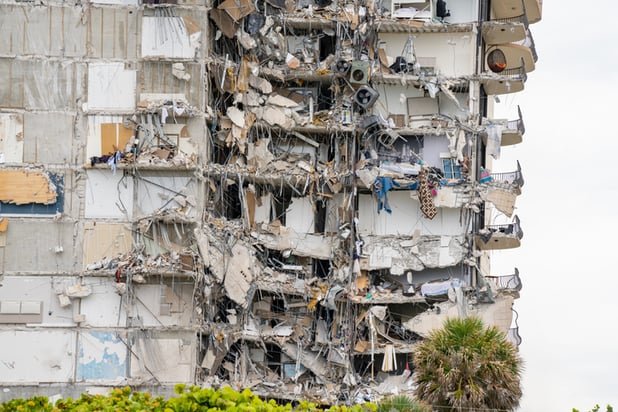

Florida condominium owners should prepare for the impact of the Miami building collapse on their insurance coverage – including higher premiums and policy changes – insiders have warned.
The disaster has already prompted several industry players across the state to discuss ways to avoid paying for similar events in the future, according to people with knowledge of the matter interviewed by the Sun Sentinel.
Among the measures being considered are for condo associations to provide engineering assessments of their buildings and undergo necessary structural repairs before getting coverage. These could put a huge dent in the pockets of thousands of unit owners in South Florida, especially with about two-thirds of condo buildings there more than 30 years old.
“A lot of insurers are going to be taking a harder look at what that risk looks like,” said Kyle Ulrich, president and chief executive of the Florida Association of Insurance Agents.
He added that insurers will likely require documentation proving that older buildings have passed local inspections and for condo associations to submit structural engineering reports for review.
While associations can recoup the costs of inspections and engineering assessments from the unit owners, insurance providers will still be forced to push up premiums to cover the cost of reviewing the reports.
However, Republican Florida Senator Jeff Brandes said that the largest cost increases for owners would not come from elevated premiums, rather the biggest hikes would be brought about by the “substantial investments” needed to repair structural defects identified in the reports.
“[Insurers] are not going to write [policies] unless they have a signed agreement that the work is going to be done,” he said.
One insurance executive interviewed by the Sun Sentinel, who refused to be named, also said that there was increasing concern among industry insiders that if the assessments lead to a “tidal wave of required repairs,” lawmakers could decide to require insurers to provide loss assessment coverage to assist with the bills.
“The industry has to look out for a stroke-of-the-pen decree that the insurer is on the hook for all loss assessments, even problems that started 30 years ago,” the executive said, adding that he expects insurers to stop offering condo unit coverage if that happens.
Some experts, however, believe that it is still too early to predict how the insurance industry will react to the building collapse.
Charles Nyce, associate professor of risk management and insurance at Florida State University, said that the insurance providers are still waiting for the results of the investigations into what caused the collapse before making major changes to their prices and policies.
“Hopefully most companies will want to find out the cause first,” he said. “This was not a normal event.”
